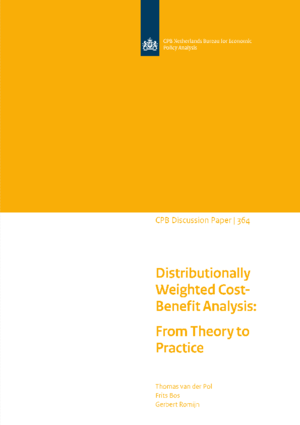Distributionally Weighted Cost-Benefit Analysis: From Theory to Practice
A case study about child care benefits in the Netherlands is presented as an illustration. We conclude that guidelines on welfare weights, normalization and practical issues are needed to facilitate experiments with case study applications of marginal welfare weights. We also argue that although distributionally weighted CBA more closely adheres to theoretical foundations, it may be demanding, prone to misuse and might distract attention from the decision problem at hand. Ultimately, welfare weighting could undermine political support for CBA. We end with a summary of other ways to highlight income redistribution in CBAs, like an overview of purchasing power effects. If these are insufficient for informed decision-making, distributionally weighted CBA could be considered as a complementary tool for policies that involve major equity effects.

